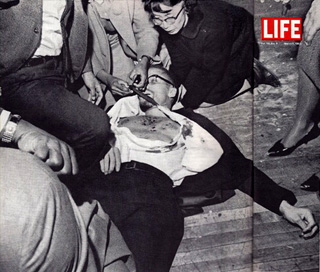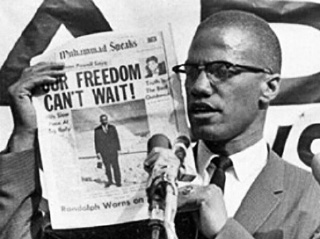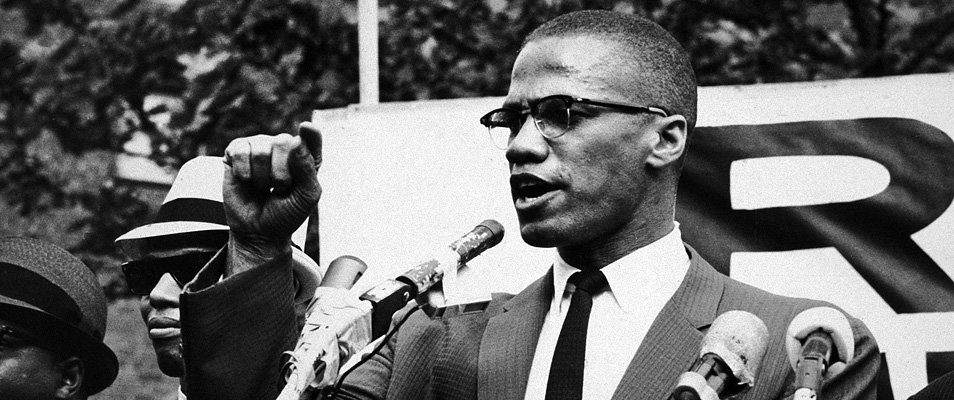By Minyoung Son
In 1964, Azizah al-Hibri, president of the debating society at American University of Beirut, invited Malcolm X to speak at the school. Al-Hibri, who later went on to found Muslim Women Lawyers for Human Rights, recalled how he bought her ice cream and encouraged her for being a female pioneer.
“Ice cream always reminds me of Malcolm,” she said on the 50th anniversary of his assassination. Al-Hibri was part of an international panel who described Malcolm X’s impact on civil rights movements worldwide.
Despite a heavy snow storm, over 300 people crowded into the Schomburg Center for Research in Black Culture in Harlem on Feb. 21, As the auditorium darkened, the event began with Malcolm X’s speech from Selma, Alabama, in 1965, where he describes his view of racists: “This is how they function, they function in mobs. That’s a coward. They put on a sheet so you won’t know who they are. That’s a coward. The time will come when that sheet will be ripped off. If the federal government doesn’t take it off, we’ll take it off.”
Malcolm X, born Malcolm Little, converted to Islam in prison and later became El Hajj Malik Shabazz. He went was a charismatic and controversial human rights leader during the Civil Rights Movement. A contemporary of Martin Luther King, he advocated not civil disobedience, but justice and equality by “any means necessary.” In 1965, an unknown assailant shot him in the Audubon Ballroom in Washington Heights.
Malcolm X upon his return from Mecca
Malcolm X made the pilgrimage to Mecca and collaborated with activists in several countries, forming many international connections. Akemi Kochiyama’s grandmother Yuri Kochiyama was a friend of Malcolm X who was with him at the end. Kochiyama showed a powerful photograph of her grandmother cradling Malcolm’s head in her hands as he lay dying from gunshot wounds.
“To many, the photo is seemed odd juxtaposition, and raises questions,” said Kochiyama. “What did these two people have to do each other?”

Yuri Kochiyama, the child of Japanese immigrants who had experienced discrimination herself became a civil right activist when she met Malcolm X in 1963. “Her friendship with Malcolm had a profound impact on her, transforming her into a revolutionary anti-imperialist,” said Kochiyama. After Malcolm had died, Kochiyama said his influence led her grandmother to keep fighting for human rights. She sought government reparations for Japanese Americans who had been interned. She organized campaigns to free activists and others whom she believed had been wrongly imprisoned.
Kochiyama mentioned the national protests over the deaths of black men at the hand of police. “She would have been excited to see the broad response from multicultural communities and organizations across the country working together for justice right now, in response to the police brutality in case of Eric Garner and Michael Brown and so many others.”
Malcolm X also had an impact on the little town Smethwick, England, according to Stephen C. Page, a community artist. Page presented his film Malcolm X: A Day in Smethwick. In it, he says that nine days before he was killed, Malcolm X visited Smethwick because he was “disturbed by reports that colored people in Smethwick are being treated like the Jews under Hitler.”
“The racial situation at that time was severe,” said Page. “No black, no Irish, no dogs.” Prejudice extended not only to black community but to other immigrants as well, he said. Malcolm showed his solidarity by posing for cameramen on Marshall Street, which some residents had called for the council to make available for white people only, Page said.
“The knowledge of his visit is minimal. He did more than was covered by the media at that time,” said Page. “I believe he was one of the greatest orators of the 20th century.”
 Ahmed Osman, who arranged the Muslim funeral rites for Malcolm X, spoke about his friend’s interesting encounters in Sudan. Dr. Osman, a Sudanese student, met Malcolm X during a Harlem mosque service. It sparked a correspondence which continued until Malcolm’s death. “He said that he was impressed the most by the Muslims of the Sudan, feeling like a heaven and home there,” said Osman.
Ahmed Osman, who arranged the Muslim funeral rites for Malcolm X, spoke about his friend’s interesting encounters in Sudan. Dr. Osman, a Sudanese student, met Malcolm X during a Harlem mosque service. It sparked a correspondence which continued until Malcolm’s death. “He said that he was impressed the most by the Muslims of the Sudan, feeling like a heaven and home there,” said Osman.
Al-Hibri described how Malcolm X told the students of American University to grab control of their own destinies. One thing Malcom X advised, said al-Hibri, was to use resources like oil as a weapon or tool for empowerment. “Nobody had talked about that before,” she said.
The night ended with a recording of students who had been studying the life of Malcolm X describing his legacy:
“I think Malcolm X connects a lot of black people today.”
“His legacy is to let you fight for what you believe is right, no matter if other people disagree with you.”
“The idea of being unapologetically black and just giving yourself a room to grow. Not to be afraid.”








